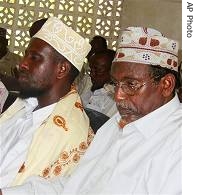2006年VOA标准英语-Somalia Peace Talks Stall Again(在线收听)
By Noel King
Khartoum
31 October 2006
Peace talks in Khartoum between Somalia's transitional government and Islamists who control much of the country have stalled for a second day. Islamists say they will not meet with the government delegation unless Ethiopian troops pull out of Somalia.
Diplomats say they are frustrated by the delay and hope the peace talks will begin soon.

Top leaders of Union of Islamic Courts, Sheikh Hussein Dahir Aweys, right, and Sheik Sharif Ahmed (file photo - Oct. 5, 2006)
Negotiations were set to start on Monday but the Somali government delegation did not arrive until late Monday evening.
The Union of Islamic Courts has refused to meet with the government delegation until Ethiopian troops withdraw from Somalia.
Ethiopia's presence in Somalia is a hotly contested issue. The Somali government has admitted that a few Ethiopian troops have been sent to the embattled nation, but denies that they are fighting alongside government forces.
On Tuesday, delegates from both sides remained at their hotel in the capital Khartoum, refusing to come to the bargaining table for a second day.
Islamists have also objected to Kenya as co-chair of the meetings, saying Kenya is not neutral and supports the presence of foreign troops in Somalia.
Kenya was set to co-chair with the Arab League, as part of its responsibilities as president of the Inter-governmental Authority on Development.
Rina Kristmoen, an observer from the Norwegian Embassy in Nairobi, told VOA that most diplomats were hoping the talks would begin soon.
"It's important that the parties meet, that they continue the dialogue and continue to try to find a solution and try to find peace in Somalia," said Kristmoen. "The deadlock is over protocol now. They are trying to decide who will chair the meeting. It's not a very big issue. It's a little bit unfortunate that it has taken so long to solve it."
Islamists now control much of southern Somalia, including the capital Mogadishu.
In response to the Islamist claim that Ethiopian troops are backing government forces, the transitional government has accused Eritrea of sending troops to bolster the Islamic Courts.
Observers fear the tension could ignite a proxy war between long-time rivals, Ethiopia and Eritrea, with Somalia as the battleground.
In two previous rounds of talks in Sudan the Somali government and Islamists have agreed to form a joint national army and police force. But observers say the agreements have had little effect.
Somalia has not had a functioning government since 1991 when warlords toppled dictator Mohamed Siad Barre.